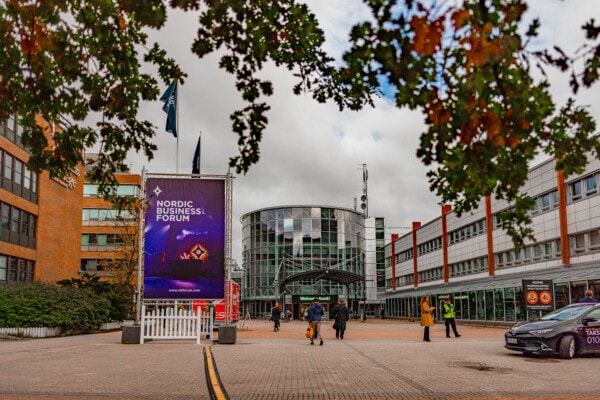27Sep2023
From the stage to the crowd, the event hall to the networking area, the 6600 attendees of day 1 of the Nordic Business Forum 2023 were surrounded by leaders that personified the change we want to see in the world.
Change is unpredictable, systemic, all encompassing. But, as our keynote speakers revealed, it’s how our people, institutions, and planet react to it that counts. Read 6 key insights on resilience in the face of change below.
Patrick Lencioni: The key to resilient teams? Focus on what gives people energy.
“Be truthful about the things that give you energy. This will transform how you work.”
In his energetic curtain raising keynote that leaned into his infectious sense of wonder and invention, Patrick Lencioni shared his secret recipe for simplifying, optimising, and energising the work of professional teams – “because when we work as a team, we get through challenges quicker.”
If a team is a living machine assembled to work on tasks and produce results, then it pays dividends to look under the hood and understand the areas in which its components – the team members – naturally excel. Excel at what? The 6 types of working genius explored in Lecioni’s new book.
Some people have innate working genius for wonder and innovation, some for discernment and for galvanising others, and some for enablement and tenacity. Unlike a mechanical device, however, everyone in your team (including you) may be working on tasks that drain them instead of energising them. Like a poorly-fitted drive shaft, a person with a genius for enablement will burn out if their work primarily consists of tasks that cause fatigue.
When we understand our innate strengths and weaknesses, challenges become energising moments, results are easier to come by, and we begin to trust each other more, which is the starting point for building functional teams.
Jos de Blok: We now need local networks more than global hierarchies
“We got used to the idea that we need bosses.”
Healthcare in many ways is managing at scale. It’s a production line that manufactures standardised, repeatable outputs that “keep revenue a little higher than costs.” But, as many burned out healthcare professionals can attest, bureaucracies lead to hierarchies, which lead to slow to react, dehumanising institutions in which agency is removed from carers, and change is tectonically slow.
Jos de Blok found a different path. His €400 million organisation, Neighbourhood Nursing Care, saw the capacity issues of Dutch Healthcare for what they really were – organisational. He realised that by focusing on building trusting, human scale relationships between nurses, patients, and the communities they serve, they would all be able to discover the networks that create the best healthcare outcomes.
By completely trusting the members of each healthcare team to self-organise, he found that they were more capable of quickly adapting to change, which in turn led to less crisis moments and conflict. Corporate hierarchy, with its top down need for standardisation and best practice, cannot serve all the needs of its employees and the people they serve. The only way to get there is by empowering people to own their roles.
Rebecca Henderson: Nordic business can inspire us to build a sustainable future.
“We are shaking the foundations of the world we have built.”
In her emotionally raw, but ultimately redemptive keynote, Rebecca Henderson first laid out the stark consequences of a planet undergoing climate upheaval. “Our civilization is only 10 000 years old, because the climate prior to this was not stable enough for us to settle.” Today, with increasingly frequent hottest days on record, biblical downpours, and unseasonal weather patterns, all signs point to another period of massive upheaval in our near future.
However, as Henderson also noted, the world is moving in other, better ways. Some models suggest that the clean energy we’ve already deployed has cut our expected global warming by half. Government, free regulation, and free markets are empowering businesses to drive value by addressing public problems and serving their communities.
Instead of shareholder value, purpose is creating businesses that treat people with dignity and respect, that make a difference. And the Nordics, one of the richest, best educated, social equality-driven regions anywhere, can be a catalyst that shows the way forward for the rest of the world. If we all dare to act today.
Maryna Saprykina: Resilient people are the DNA of resilient organisations
“Every business today needs a resilience strategy.”
There is no more immediate crisis than an occupying force on your doorstep. For Maryna Saprykina, Founder of Ukrainian Women’s Entrepreneurs Hub and one of the millions of displaced Ukrainian women around the world today, the Russian invasion of her home country was the latest, most visceral moment in a crisis that has impacted her nation for decades. And it was also her catalyst to act.
She returned to Ukraine after 6 months in Vienna with 2 main objectives: to help Ukrainian businesses to build more resilience, and to help displaced Ukrainian women build businesses. She continues to achieve both to this day.
According to Saprykina, businesses that found a way to operate throughout the conflict have 5 things in common: speed of decision making and action, a greater purpose to unite behind, values they act out (even when they cause short term harm), a duty of care for colleagues, families, and loved ones, and the tenacity to find new ways to serve. Critically, these characteristics are also what have brought the Ukrainian people together. They are the foundation upon which resilient people, businesses, and countries are built.
Mo Gawdat: AI isn’t the problem – it’s how humanity behaves once it arrives
“The end of innovation delivered by human brains is near.”
50 years ago, we didn’t think a computer would become the world’s best Go player. We never thought technology would be capable of producing art and music that rivals anything created by our organic intelligence. But, as Mo Gawdat cautions, “The moment of AI singularity is fast approaching and normal laws will no longer apply.”
Chat GPT 3.5 has an IQ of 155. Chat GPT 4 has an IQ of around 10,000. Imagine what Chat GPT 5 will be. Just by looking at the multiple inflection points AI has already passed through, the arrival of General Artificial Intelligence is inevitable within the next few years. But, as Gawdat points out, “intelligence is not inherently bad, it’s what got us here in the first place.”
So, instead of framing the arrival of AI as our main challenge, we need to turn the mirror on ourselves and examine our own behaviours. An abundance of intelligence can tackle climate change, diffuse conflict, and extend lives. This is why we need to petition our governments to put humanity on top of capitalism – the impending abundance of intelligence is the moment we should ditch our scarcity mindsets and set ourselves free.
Scott Galloway: Unlike the Metaverse, AI has a concrete use case.
“We are drowning in data. Refining it through AI is the new oil rush.”
If new technology hyper sceptic and market analyst Scott Galloway thinks AI is the real deal, then we should all take notice. While he took time to single out the Metaverse and Dogecoin during his day 1 closing keynote as examples of technologies without real use cases, Galloway accepts that AI has already delivered seismic productivity increases for people and businesses everywhere.
In fact, because paradigm shifting technologies like AI are so much better (and cheaper) than their competitors, “AI is likely to be the most deflationary thing to happen to the global economy over the next 2 years.” When productivity increases, salaries bottom out (people are more reluctant to ask for a raise because they don’t want a machine to take their job) and costs lower.
Productivity today means refining and utilising data to power business. That’s why companies like Microsoft and Amazon have been able to add the equivalent of the GDPs of Germany and South Korea to their annual turnovers. The market is already proving that AI strategy is actually business strategy from today onwards.


